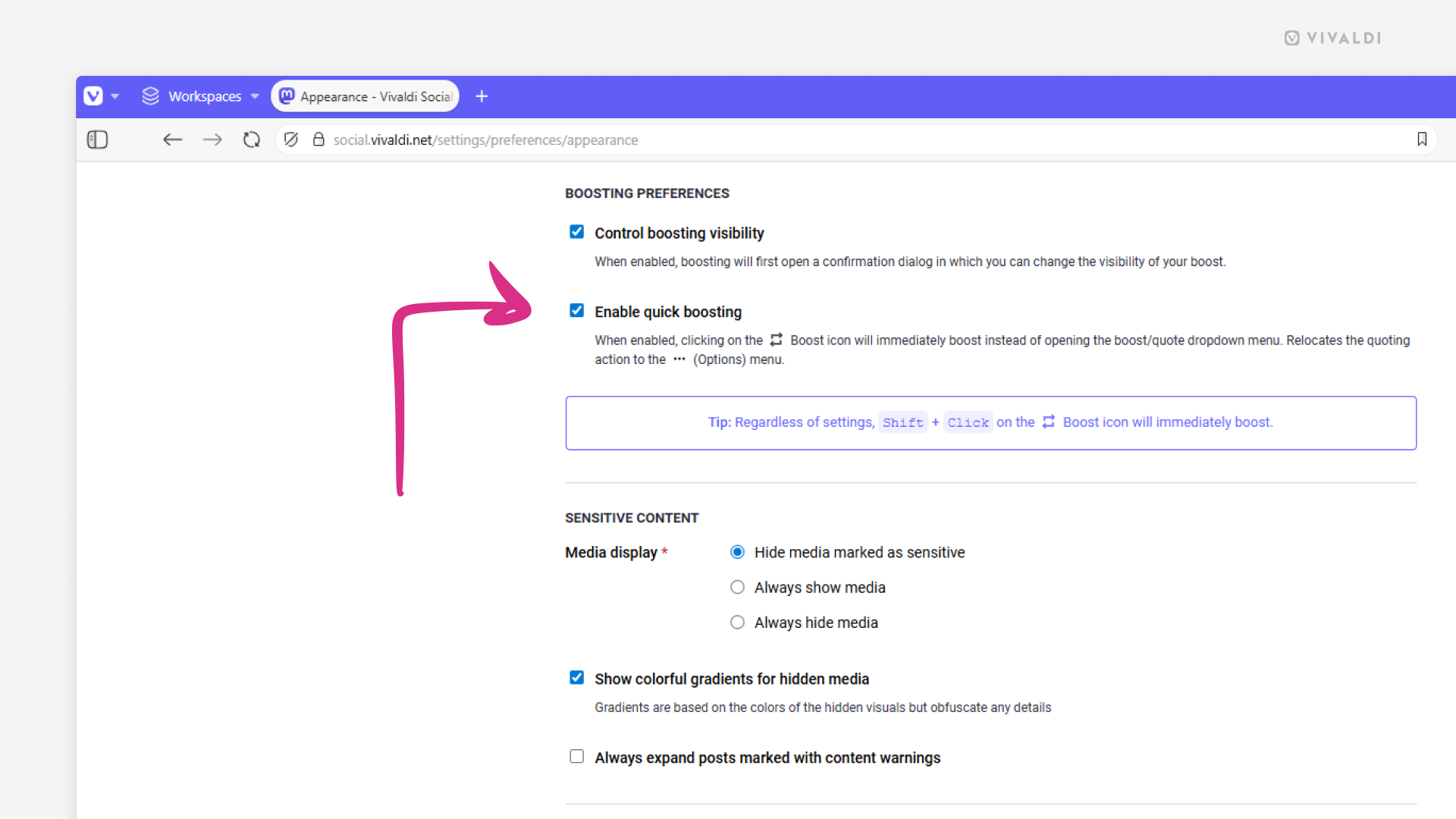Vivaldi Tips
A huge collection of Vivaldi browser tips, tricks and hacks.
Tip #789
February 3, 2026
Tile a tab opened from a link with its parent tab in one move.
In a tiled view, you’ll have two or more tabs displayed simultaneously, allowing you to conveniently browse and compare content on multiple web pages at once. There are many ways to tile tabs, but if you’re about to open a link from a web page that you will be tiling with the active tab, follow the instructions below to cut this multi-step action down to just one step.
To create a tiled view from a link:
- Right-click on a link on the web page.
- Select Open Link In > Open Link as Tiled Tab.
When you do the same on an already tiled tab, the new tab will be added to the tiled view.
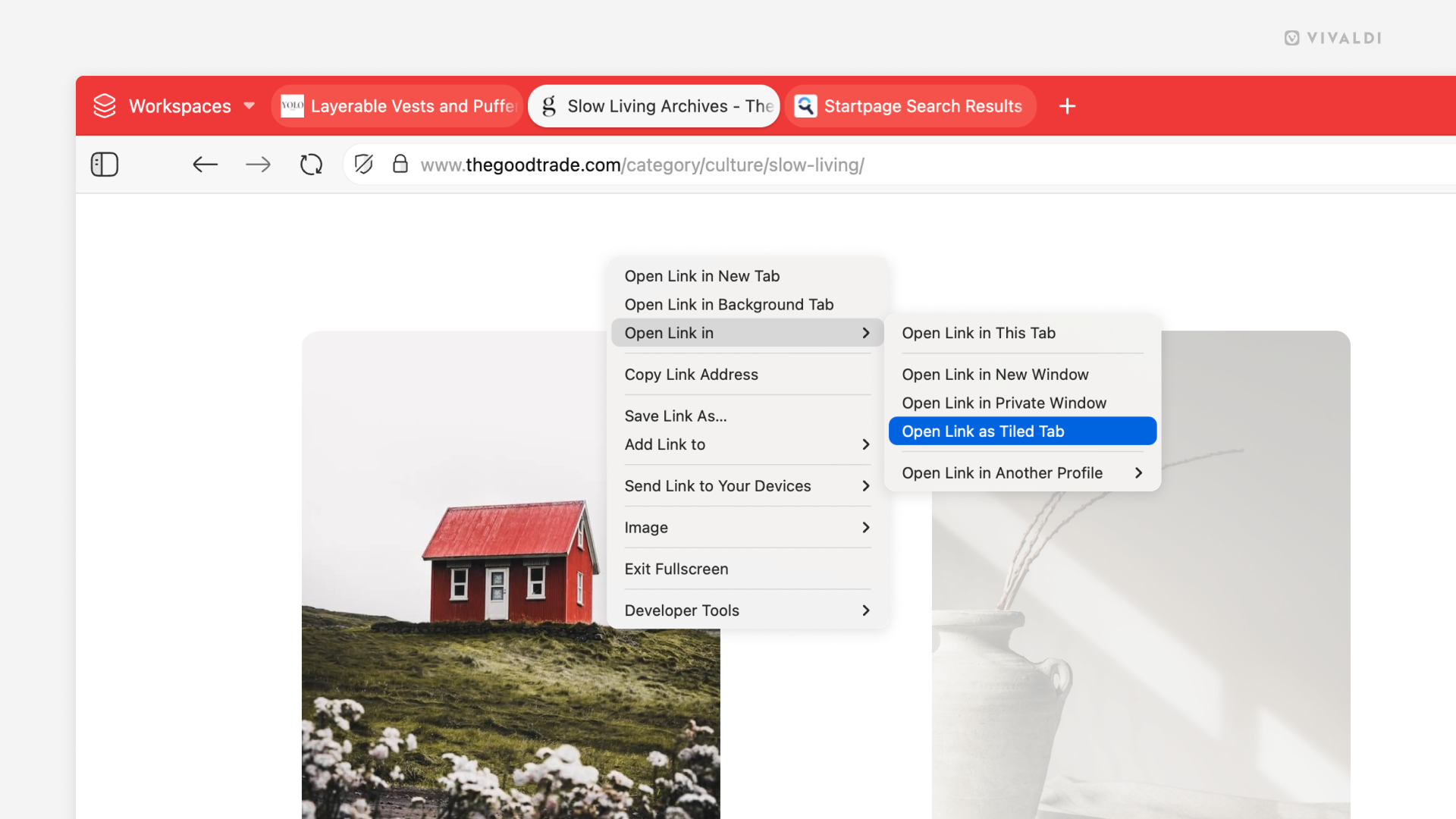
Tip #787
January 29, 2026
Restrict pinned tabs to the current site.
Pinning tabs allows you to keep your most-used tabs open and available in the same location at all times. But that doesn’t prevent you from straying from the originally pinned site. To make sure your pinned tabs stays on the site, you can restrict browsing in that tab to the pinned domain.
To keep the Pinned Tabs locked to the same domain:
- Right-click on the pinned tab.
- Select Restrict Pinned Tab to Current Site.
When enabled, all links from the same domain will open in the pinned tab and all links from other domains will open in new regular tabs.
Tip #786
January 27, 2026
Place the Tabs close button where it’s convenient for you.
Vivaldi is famous for allowing you to configure the smallest of details. One such detail is the location of the tabs close button on the Tab Bar.
To choose the close button’s side:
- Go to Settings > Tabs > Tab Display > Tab Options.
- From “Display Close Button’s” subsettings, toggle “On Left Side” on or off, as needed.
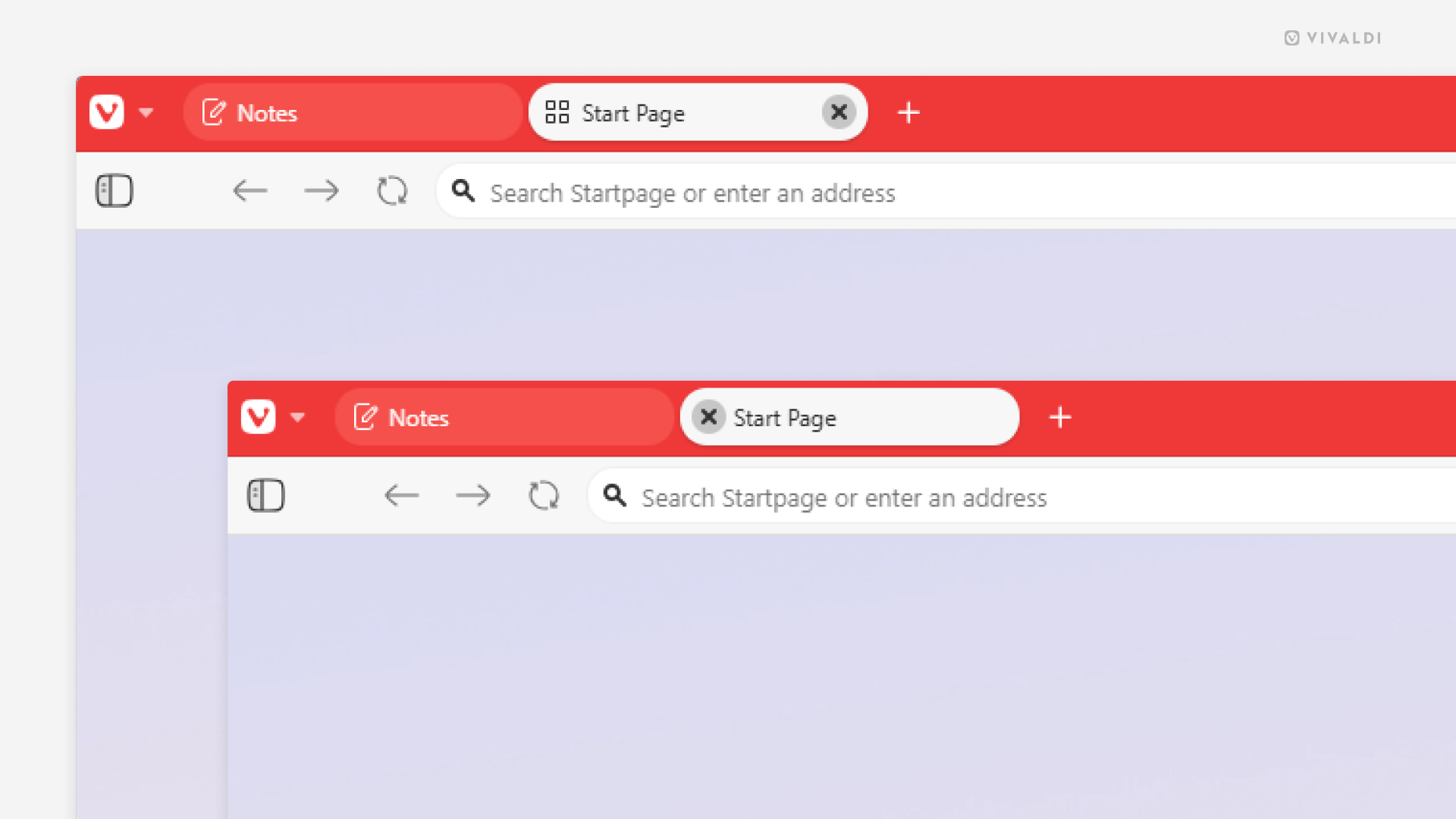
Tip #785
January 22, 2026
Reuse or delete Workspaces that no longer serve a purpose.
When you’re done with a project that you created a Workspace for in Vivaldi it’s time to reuse it for a new project, or if there are currently no new projects, just delete it.
To reuse a Workspace:
- Open the Workspaces menu.
- Right-click on the one you want update.
- Select “Edit Workspace” from the context menu.
- Give it a new name and select a new icon.
- Click “Done”.
- Close all tabs in the Workspace.
To delete a Workspace:
- Open the Workspaces menu.
- Right-click on the Workspace you want update.
- Select “Delete Workspace”.
Deleting a Workspace will also close all tabs in it. If you want to keep some tabs around, move the tabs first or reopen them from the Closed Tabs menu.
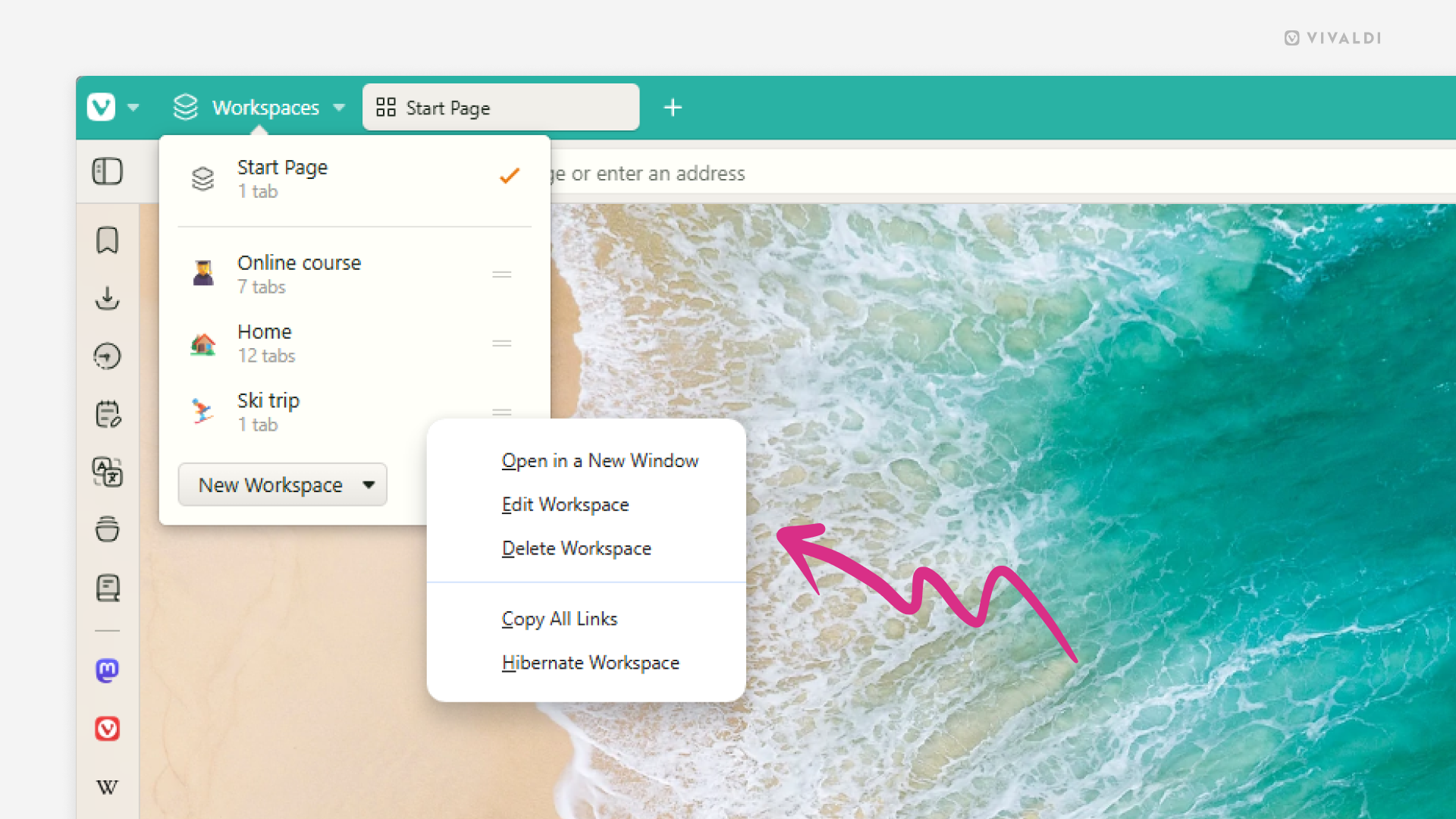
Tip #784
January 20, 2026
Set up bookmark folders in Vivaldi on Android to efficiently manage your favorite sites.
Dividing your bookmarks in Vivaldi into logically structured folders makes accessing them faster and managing them easier. There are a few ways you can create new bookmark folders in Vivaldi on Android. Find the one that works best for you.
To create a new bookmark folder on the Start Page:
- Long-press on the “Add” button on the Start Page.
- Select “Folder”.
- Give the new folder a name and select a parent folder (Location).
- Tap “Done”.
To create a new Speed Dial Group (bookmark folder on the Start Page):
- Swipe past the last group on the Start Page.
- Tap on “Add New Group”.
- Give the new folder a name.
To create a new folder by editing a bookmark:
- Find a bookmark you’d like to add to the new folder in the Bookmarks Panel or Start Page.
- Long-press on the bookmark and select “Edit” (pencil icon in the Bookmarks Panel).
- Tap on the current folder.
- Tap on “New Bookmark Folder”.
- Give the new folder a name and select a parent folder (Location).
- Tap on “Done” in the top right corner 3 times.
To create a new folder when adding a new bookmark.
- Go to the page you want to bookmark.
- Add it as a new bookmark from the main menu.
- Tap on the banner that appears at the bottom of the page.
- Tap on the current folder.
- Tap on “New Bookmark Folder”.
- Give the new folder a name and select a parent folder (Location).
- Tap on “Done” in the top right corner 3 times.

Tip #783
January 15, 2026
Open multiple Progressive Web App windows to improve your workflow.
Progressive Web Apps (PWAs) are a great way to make a website feel like an independent app without actually needing to install a native app. Sometimes you may find yourself needing to view content from multiple PWA pages at once, though. You could open the other page in the main Vivaldi browser window, but you could also open it in a second PWA window.
To open a page from the PWA’s domain in another window:
- Right-click on the link.
- Select “Open link in new [PWA name] window”.
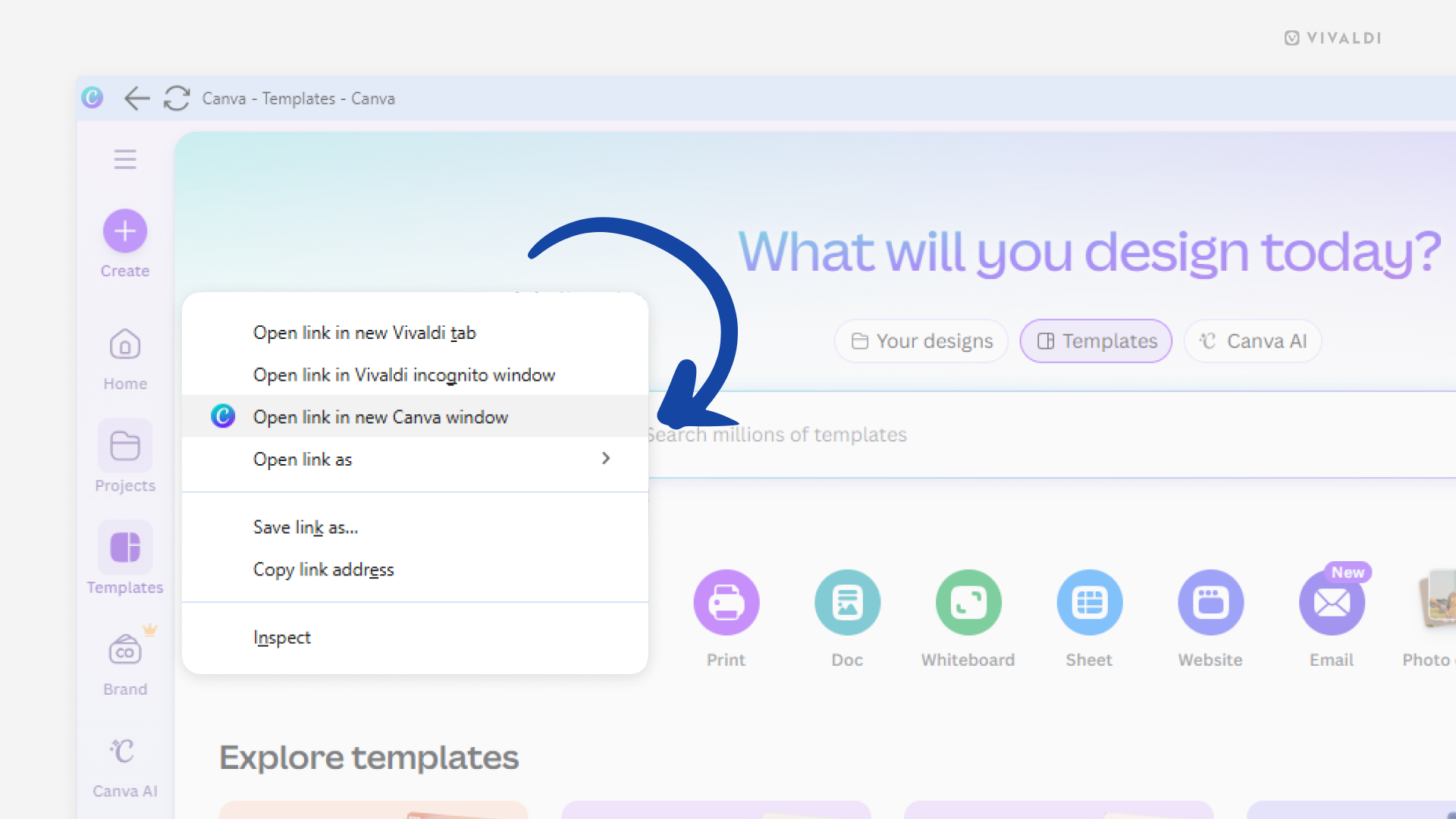
Tip #782
January 13, 2026
Tap on your iPhone’s status bar to scroll to the top of the page.
There’s a neat little feature on iPhones and iPads, which you can use when you’ve made your way down a page to scroll all the way back to the top. You simply need to tap on the status bar at the top edge of the screen to return to the top of the page.
In Vivaldi, this means that you can quickly return to the start when you’ve scrolled on a web page for a while, made it far down the list on the Start Page or in Panels, or dug deep on longer Settings pages.
Tip #781
January 8, 2026
Reorder Tab Button sections to find the right tab faster.
Need quick access to synced or recently closed tabs rather than open tabs? Update the order of sections in the Tab Button popup to match your preferences.
To reorder sections:
- Open the pop-up menu.
- Click and drag the section you want to move.
- Release the mouse button to drop the section at its new location.
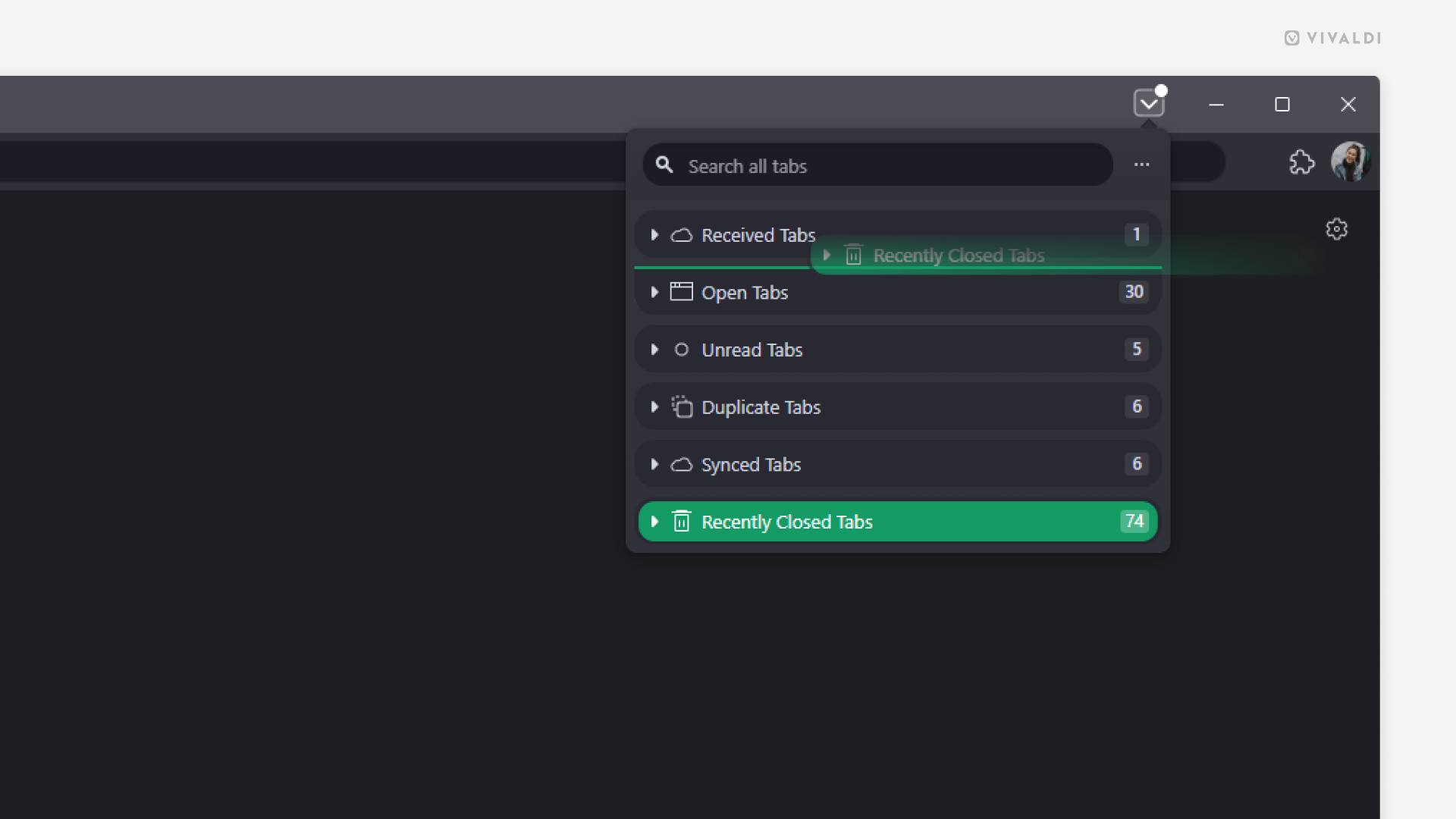
Tip #780
January 6, 2026
Switch Speed Dials from the right-click menu.
Have you hidden the navigation bar on the Start Page for a more minimalistic look, but still want to access your various Speed Dial groups? Luckily, Vivaldi offers you an alternative navigation option.
To switch Speed Dial groups:
- Right-click on an empty area on the Start Page.
- Click on the Speed Dial group’s name you want to switch to.
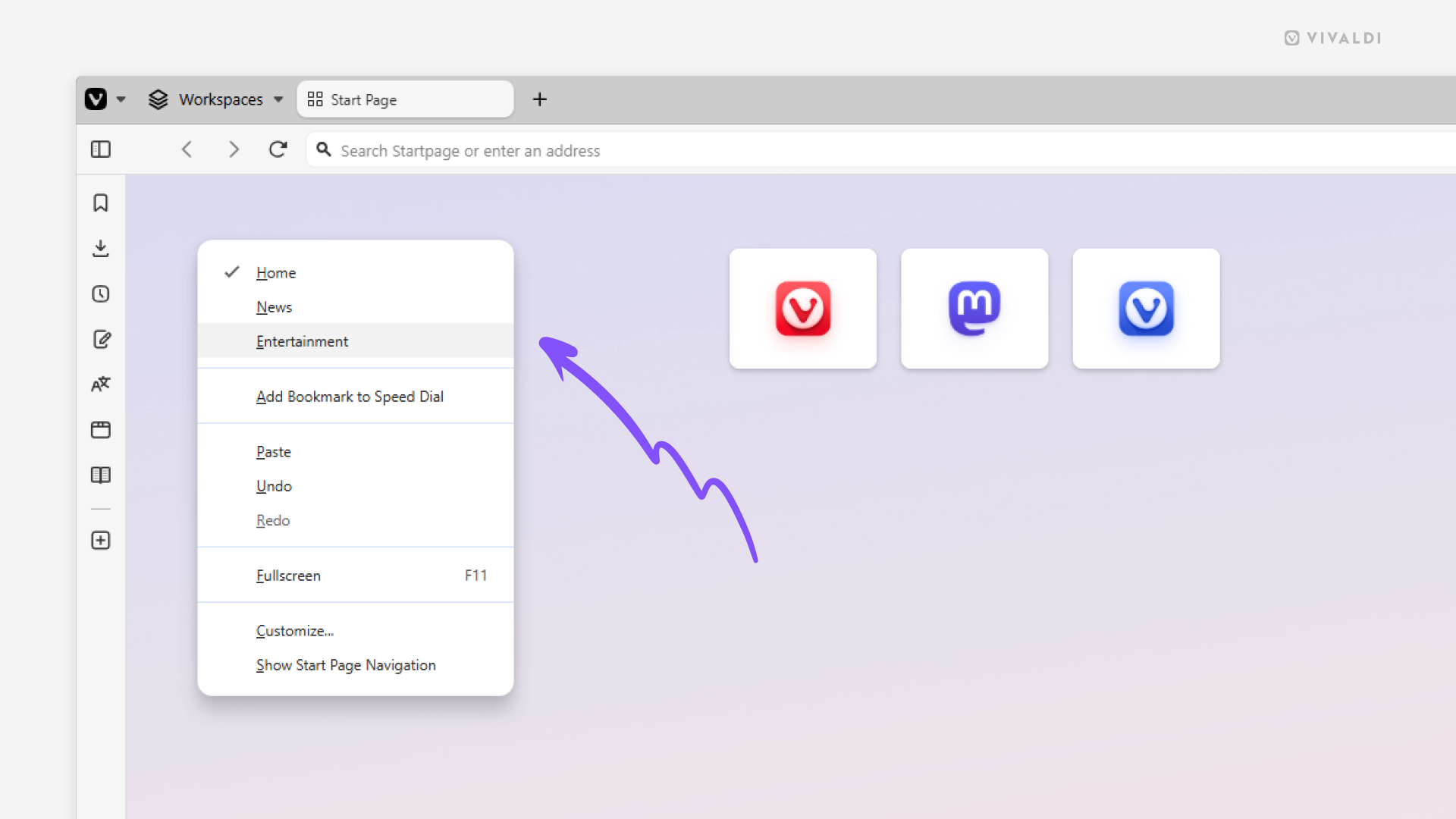
Tip #779
December 18, 2025
Set up an auto-reply in Vivaldi Webmail.
Whenever you won’t be checking your mailbox for a while, for example, because you’re going on vacation, an automatic reply will inform your contacts of your absence.
To set up an auto-reply in Vivaldi Webmail:
- Log in to your account on https://webmail.vivaldi.net/.
- Go to Settings > Filters.
- Click on “Create” near the top right of the page.
- Give the filter a name.
- Select a scope. Do you want to send the auto-reply to all incoming messages or only to ones matching certain rules?
- Set up rules, if you chose that option.
- From the Actions drop-down menu, select “Reply with message”.
- Enter your reply’s text and give the message a subject.
- Click “Save”.
When you return from your leave, simply open the filter in Settings and toggle off “Filter enabled”. Don’t forget to click “Save”!
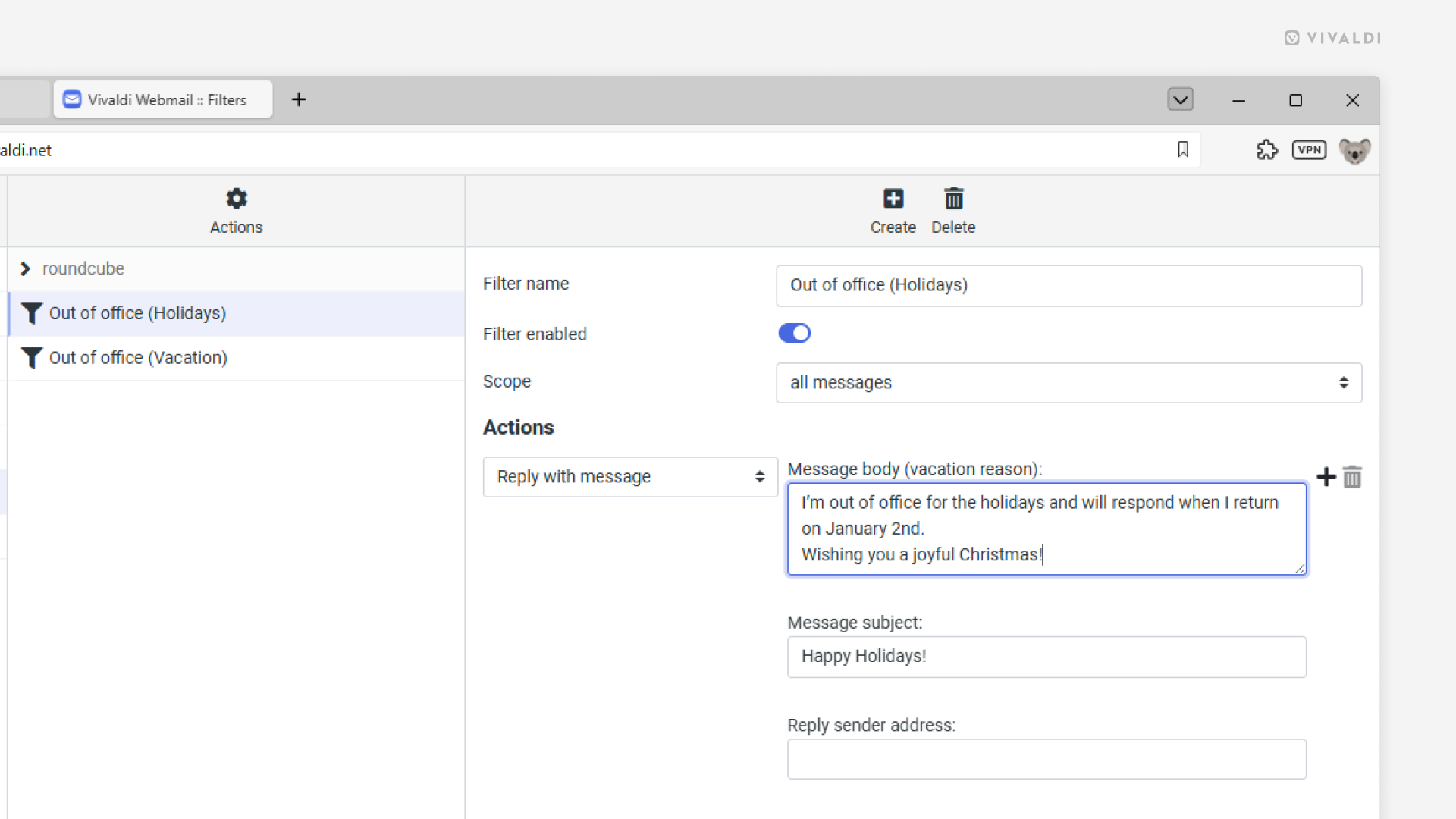
Tip #778
December 16, 2025
View and add tasks in the Tasks widget on the Start Page.
There are several ways you can view and add tasks to your calendar in Vivaldi. In this tip, we’re going to look at a way to do it on the Start Page.
First, to add a Tasks widget:
- Click on the “Widget” button at the bottom of the Start Page.
- Select “Tasks”.
To add a new task:
- Click on “Add Task” in the widget.
- Give the task a title, and, if needed, add a deadline and additional information.
- Click “Add Task”.
To mark tasks as done via the Tasks widget, simply click on the checkbox in front of the task’s title.
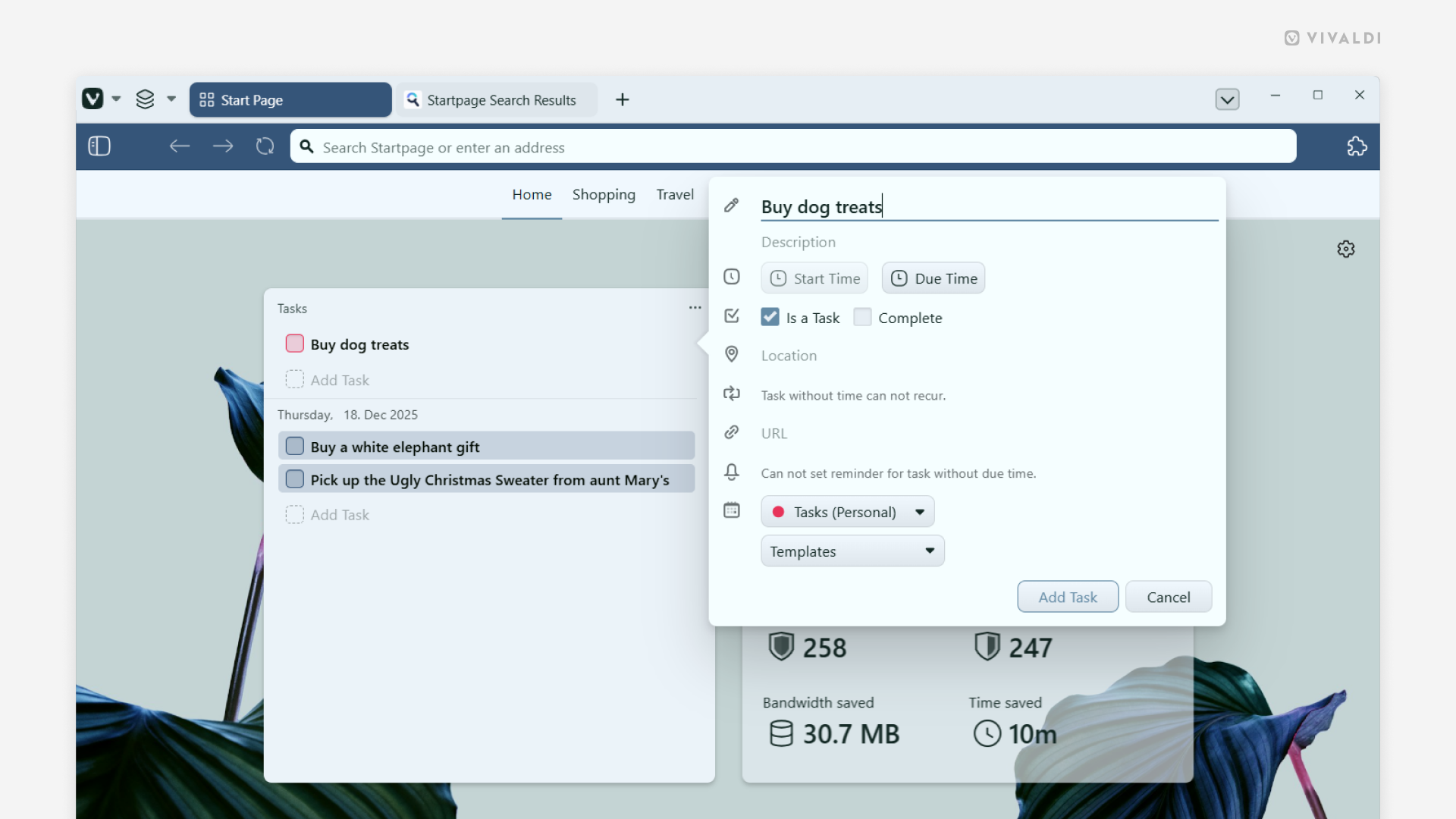
Tip #777
December 11, 2025
Share posts on Vivaldi Social with one click by enabling quick boosting.
When you want to share someone’s post on Vivaldi Social, clicking the Boost button will open a menu where you can select whether to share the post without any additional context, i.e. Boost, or with added commentary, i.e. Quote.
If you know that you just want to boost the post, hold down the Shift key, while clicking on the Boost button. That way you can skip the menu selection and confirmation.
When most of the time you just boost posts, you can also enable quick boosting:
- Go to Preferences > Appearance > Boosting Pereferance.
- Tick the box for “Enable quick boosting”.
To skip the confirmation dialog, which allows you to change the boost’s visibility setting, also untick the box for “Control boosting visibility”. - Click “Save changes”.
